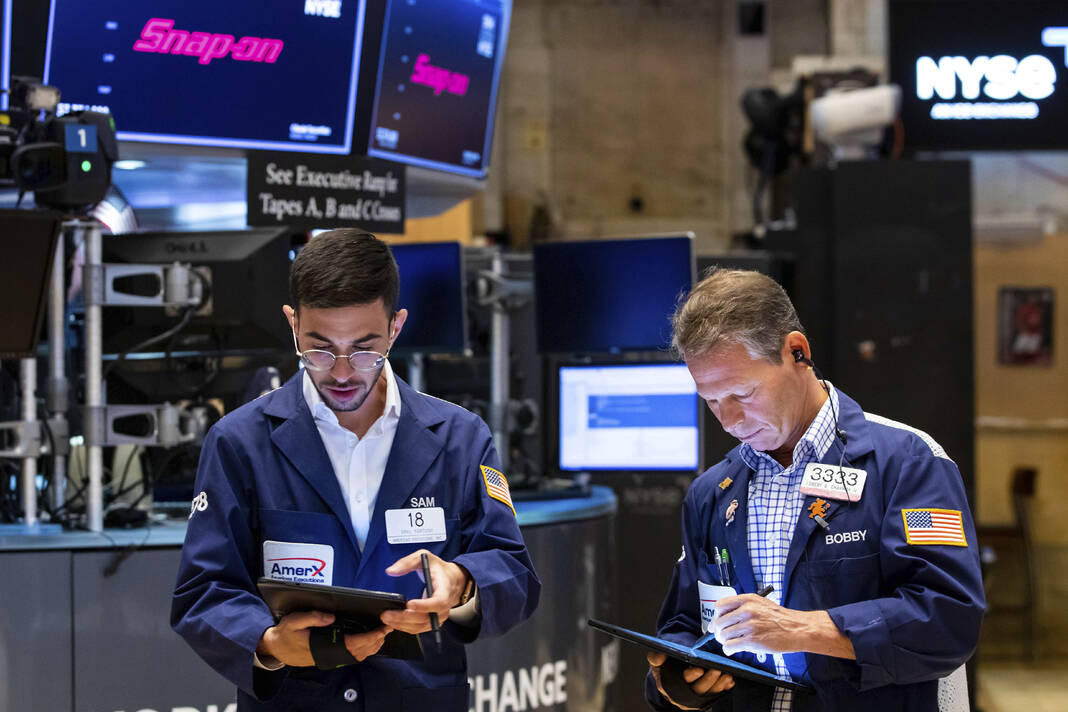
NEW YORK (AP) — Stocks fell sharply Friday following Wall Street’s cold realization that inflation got worse last month, not better, as investors had been hoping.
The S&P 500 was 2.7% lower in midday trading, while moves in the bond market indicated investors’ concerns are building about the economy’s strength. The Dow Jones Industrial Average was down 750 points, or 2.3%, at 31,522 as of 11:45 a.m. Eastern time, and the Nasdaq composite was 3.4% lower.
Wall Street came into Friday hoping a highly anticipated report would show the worst inflation in generations slowed a touch last month. Instead, the U.S. government said inflation accelerated to 8.6% in May from 8.3% a month before.
The Federal Reserve has already begun raising interest rates and making other moves in order to slow the economy, in hopes of forcing down inflation. Wall Street took Friday’s reading to mean the Fed’s foot will remain firmly on the brakes for the economy, dashing hopes that it may ease up later this year.
“Inflation is hot, hot, hot,” said Brian Jacobsen, senior investment strategist at Allspring Global Investments. “Basically, everything was up.”
The growing expectation is for the Fed to raise its key short-term interest rate by half a percentage point at each of its next three meetings, beginning next week. That third one in September had been up for debate among investors in recent weeks. Only once since 2000 has the Fed raised rates by that much, last month.
“No relief is in sight, but a lot can change between now and September,” Jacobsen said. “Nobody knows what the Fed will do in a few months including the Fed.”
The nation’s high inflation, plus the expectations for an aggressive Fed, have sent Treasury yields toward their highest levels in years and the S&P 500 down 18.5% from its record set early in January. The worst pain hit high-growth technology stocks, cryptocurrencies and other particularly big winners of the pandemic’s earlier days. But the damage is broadening out as retailers and others are warning about upcoming profits.
A stock’s price rises and falls on two things, essentially: how much cash a company produces and how much an investor is willing to pay for it. The Fed’s moves on interest rates heavily influence that second part.
Since early in the pandemic, record-low interest rates engineered by the Fed and other central banks helped keep investment prices high. Now “easy mode” for investors is abruptly and forcefully getting switched off.
Not only that, too-aggressive rate hikes by the Fed could ultimately force the economy into a recession. Higher interest rates make borrowing more expensive, which drags on spending and investments by households and companies.
One of the fears among investors is that food and fuel costs may keep surging, regardless of how aggressively the Fed moves.
“The fact is that the Fed has very little ability to control food prices,” Rick Rieder, BlackRock’s chief investment officer of global fixed income said in a statement. He pointed instead to mismatches in supplies and demand, higher costs for energy and wages and the crisis in Ukraine, which is a major breadbasket for the world.
That raises the threat that central banks will overly tighten the brakes on the economy, as they push ineffectually against a string “and essentially fall into a damaging policy mistake,” Rieder said.
The economy has already shown some mixed signals, and a report on Friday indicated consumer sentiment is worsening more than economists expected. Much of the souring in the University of Michigan’s preliminary reading was due to higher gasoline prices.
That adds to several recent profit warnings from retailers indicating U.S. shoppers are slowing or at least changing their spending because of inflation. Such spending is the heart of the U.S. economy.
The two-year Treasury yield zoomed to 2.99% following the inflation report, after touching its highest level since 2018. It’s up from 2.83% late Thursday.
The 10-year yield was also up, but not quite as dramatically as the two-year yield, which is more influenced by expectations for Fed movements. The 10-year yield climbed to 3.14% from 3.04%.
The narrowing gap between those two yields is a signal that investors in the bond market are more concerned about economic growth. Usually, the gap is wide, with 10-year yields higher because they require investors lock away their dollars for longer.
A jump for the two-year yield above the 10-year yield would be a signal to some investors that a recession may hit in a year or two.
“A higher-than-expected CPI number seals the deal on investors’ fears,” Mike Loewengart, managing director at E-Trade from Morgan Stanley, wrote in a research note. “And though consumers may be experiencing high prices in their day-to-day, especially at the pump, it’s disappointing to see that we don’t have a lid on inflation yet, despite the Fed’s efforts.”
The S&P 500 is on track to close out its ninth losing week in the last 10, and Friday’s losses were widespread.
More than 90% of stocks in the index dropped. Big Tech stocks were some of the the heaviest weights amid broad losses for the biggest winners of the prior ultralow-rate era. Apple and Microsoft each fell more than 3.4%, while Amazon dropped 5.9% and Nvdia sank 5.8%.
Stocks also fell in Europe for a second day after the European Central Bank said it would raise interest rates for the first time in more than a decade to combat inflation.
___
AP Business Writer Elaine Kurtenbach contributed.


